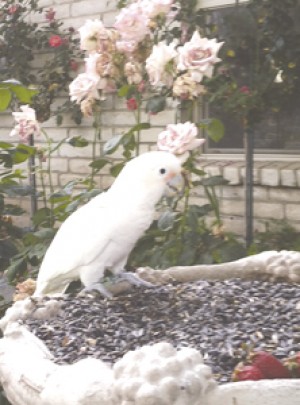 Harry the cockatooHANFORD — There's almost nothing worse than a noisy neighbor with their music blasting into your house at 3 a.m. It’s even worse when a new noise maker moves into the neighborhood, disturbing the harmony that has taken years to create.
Harry the cockatooHANFORD — There's almost nothing worse than a noisy neighbor with their music blasting into your house at 3 a.m. It’s even worse when a new noise maker moves into the neighborhood, disturbing the harmony that has taken years to create.
But what if this new neighbor is not some hooligan playing their music at all hours, but Harry, a 9-year-old white cockatoo?
For those who live near West Fargo Avenue and North Douty Street, that was the reality for more than two months. Harry the cockatoo had taken up residence, and he was not afraid to squawk and let everyone know it.
Cockatoos are a kind of large parrot that have a signature crest on their heads and are native to the islands of the South Pacific and Australia. They usually range in size from 11 to 30 inches tall and can live up to 60 to 90 years in captivity.
When Larry Dias realized he had a cockatoo living in his front yard, he called Valley Oaks SPCA in Visalia, which was handling animal control services for the county at the time. Dias learned a police report had been filed about a missing cockatoo. Harry’s owner was contacted and told where to find him.
However, animal control officers were unsuccessful in catching Harry. Dias says Harry was just too smart for them. Gary Patch, Harry’s owner, said that when he went to where Harry was supposed to be, the bird would either have already left or wouldn't let Patch get close enough to catch him.
According to Justin Helt, animal control supervisor at Valley Oaks SPCA, birds are always the most difficult to catch compared to dogs or cats. For insurance reasons, the animal control workers are not able to climb up into the trees to get them. The most they can do is put bird feed on the ground or try to throw a towel over the bird.
Helt says that although animal control officials do get reports about birds, it is very uncommon to get a report about a such a rare bird being loose.
Harry made himself very comfortable, eating from the neighbors’ trees, scaring the crows away and sleeping in Dias’ front yard.
According to Dias, Harry was so friendly he even landed on a neighborhood boy’s shoulder.
Despite what might be considered an initial annoyance with his loud squawking, Harry soon became part of the neighborhood. What worried Dias was Harry’s safety.
“He is fine now,” Dias said. “But what will happen in the winter?”
Dias was also concerned when he saw that strangers were taking an interest in Harry. One stranger who was driving by even told Dias, “Do you know that bird is worth a lot of money?”
“I just really want him taken care of,” Dias said. “I just want him safe.”
Patch also just wants Harry to be taken care of, especially if he is not able to catch him.
“I do miss him as much as my grandkids who loved to talk to him,” he said. “I hope that whoever catches him cares for him.”
Dias is not sure if Harry is safe now, but it appears the cockatoo has decided to leave the neighborhood. It is unclear if Harry’s owner finally picked him up or if Harry just decided he wanted a change of scenery. But if you see a white cockatoo flying over Hanford, it’s most likely Harry.